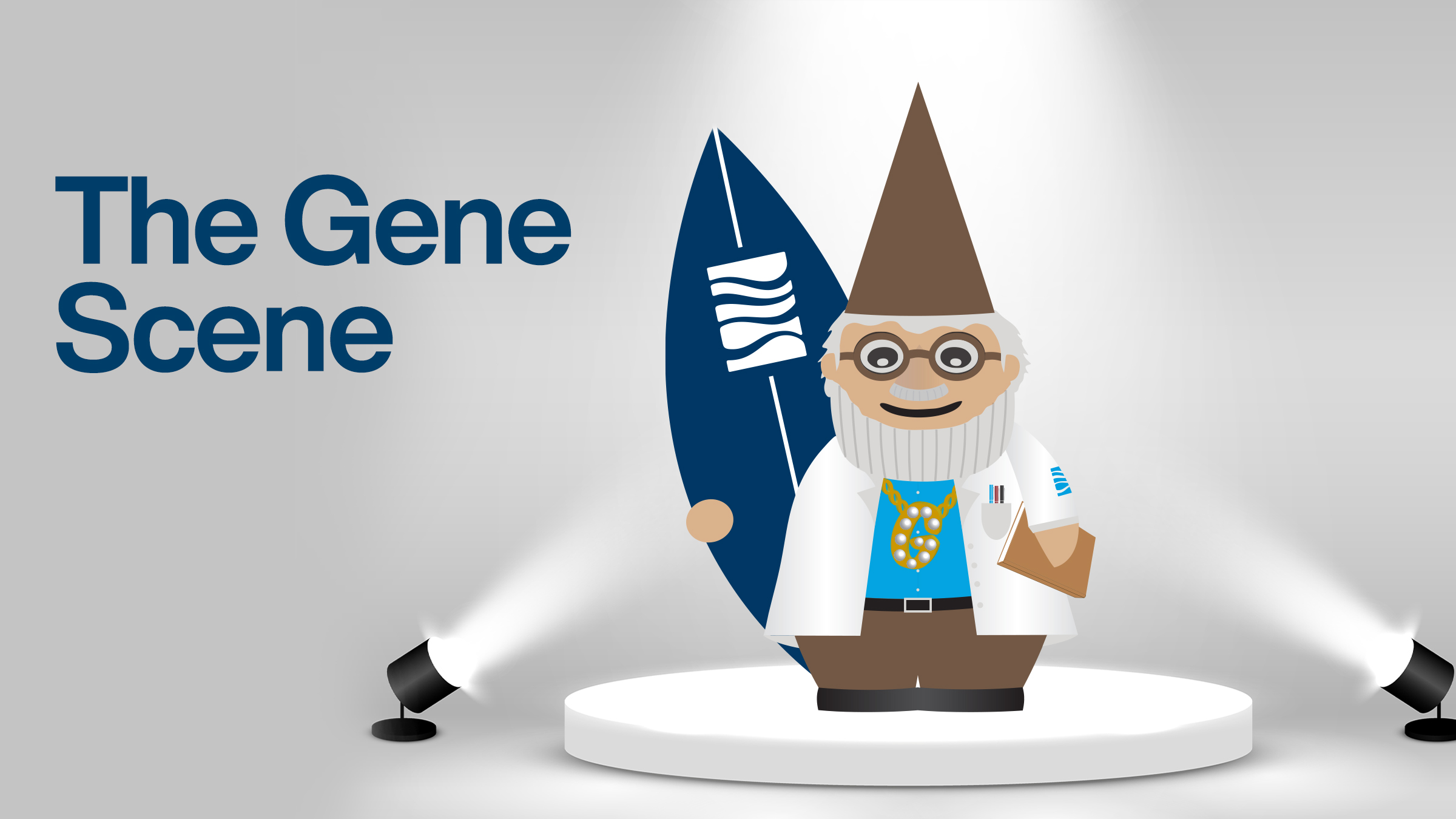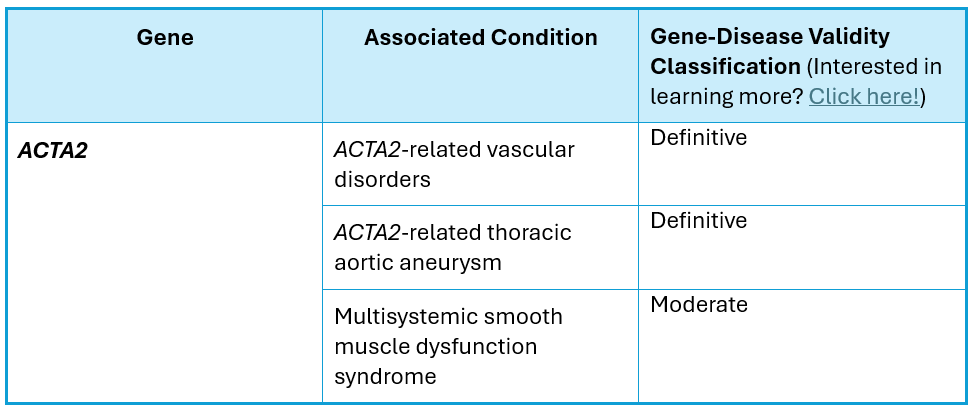
Welcome to the Gene Scene! Each week, we will explore a gene from the ACMG Secondary Findings list—genes identified by the American College of Medical Genetics and Genomics as having clear, actionable health implications.These genes are included because they’re linked to serious but preventable or manageable conditions when identified early. Here, we focus on the condition that led to the gene’s inclusion on the list, providing clear, relevant information that supports your clinic. To subscribe to the Gene Scene, contact your local GSL or send a request to info@ambrygen.com.
To access the Gene Scene archives, visit our blog.
Clinical Phenotype Summary:
The ACTA2 gene (NM_001613.2), which contains 8 coding exons and is located on chromosome 10q23.31, encodes the aortic smooth muscle actin protein. Pathogenic alterations in this gene have been associated with ACTA2-related vascular disorders, including familial thoracic aortic aneurysms and dissections (TAAD) and multisystemic smooth muscle dysfunction syndrome (MSMDS), which are inherited in an autosomal dominant fashion.
Pathogenic variants in ACTA2 are the most frequent cause of familial TAAD, estimated to account for up to approximately 20% of cases.
ACTA2-related vascular disorders and thoracic aortic aneurysm is characterized by:
• Isolated thoracic aortic aneurysm and/or dissection (TAAD)
And may include additional traits:
• Patent ductus arteriosus (PDA)
• Livedo reticularis
• Iris floccule
Penetrance is reduced for this condition. Mechanism of disease is unclear for ACTA2-related vascular disorders.
Multisystemic Smooth Muscle Dysfunction Syndrome (MSMDS) is characterized by:
• Fully penetrant in infancy:
o Congenital mydriasis
o Patent ductus arteriosus (PDA)
o Aortopulmonary window (APW)
• Fully penetrant with age:
o Thoracic aortic and cerebrovascular disease
• Varying penetrance, additional features:
o Pulmonary arterial hypertension (PAH)
o Hypotonic bladder
o Hypoperistalsis and/or malrotation of the gut
De novo alterations affecting amino acid Arginine 179 (p.R179) in ACTA2 are the most common cause of MSMDS.
Unique Considerations:
The ACTA2 phenotype may also be referred to as non-syndromic Heritable Thoracic Aortic Disease (HTAD). The GeneReviews Heritable Thoracic Aortic Disease page has a useful chart with other genes included under the HTAD designation.
Clinical Resources:
• Understanding Your VUS Genetic Test Result for Thoracic Aortic Aneurysms/Dissections (TAAD) or Related Conditions
• Understanding Your Positive Genetic Test Result for Thoracic Aortic Aneurysms/Dissections (TAAD) or Related Conditions
• Understanding your Secondary Findings Result
Citations:
ACTA2-related vascular disorders and thoracic aortic aneurysm:
• Guo et al. Nat Genet. 2007 Dec;39(12):1488-93. PMID: 17994018
• Morisaki et al. Hum Mutat. 2009 Oct;30(10):1406-11. PMID: 19639654
• Disabella et al. Heart. 2011 Feb;97(4):321-6. PMID: 21212136
• Guo et al. Am J Hum Genet. 2009 May;84(5):617-27. PMID: 19409525
• Regalado et al. Circ Cardiovasc Genet. 2015 Jun;8(3):457-64. PMID: 25759435
• Milewicz et al. GeneReviews. 2003 Feb 13 [Updated 2023 May 04]. PMID: 20301299
Multisystemic Smooth Muscle Dysfunction Syndrome (MSMDS):
• Milewicz et al. Am J Med Genet A. 2010 Oct;152A(10):2437-43. PMID: 20734336
• Munot et al. Brain. 2012 Aug;135(Pt 8):2506-14. PMID: 22831780
• Regalado et al. Genet Med. 2018 Oct; 20(10):1206-1215. PMID: 29300374
• Kaw et al. Am J Med Genet A. 2022 Aug;188(8):2389-2396. PMID: 35567597
• Logeswaran et al. Am J Med Genet A. 2017 Apr;173(4):959-965. PMID: 28328125
• Lupo et al. Am J Med Genet A. 2023 Apr;191(4): 1111-1118. PMID: 36607831
Ambry Genetics Gene-Disease Validity Scheme
Each week, we explore a gene from the ACMG Secondary Findings list—genes identified by the American College of Medical Genetics and Genomics as having clear, actionable health implications. These genes are included because they’re linked to serious but preventable or manageable conditions when identified early.
To learn more about the ACMG Secondary Findings list, click here.
To read all previous Gene Scene emails, click here.




